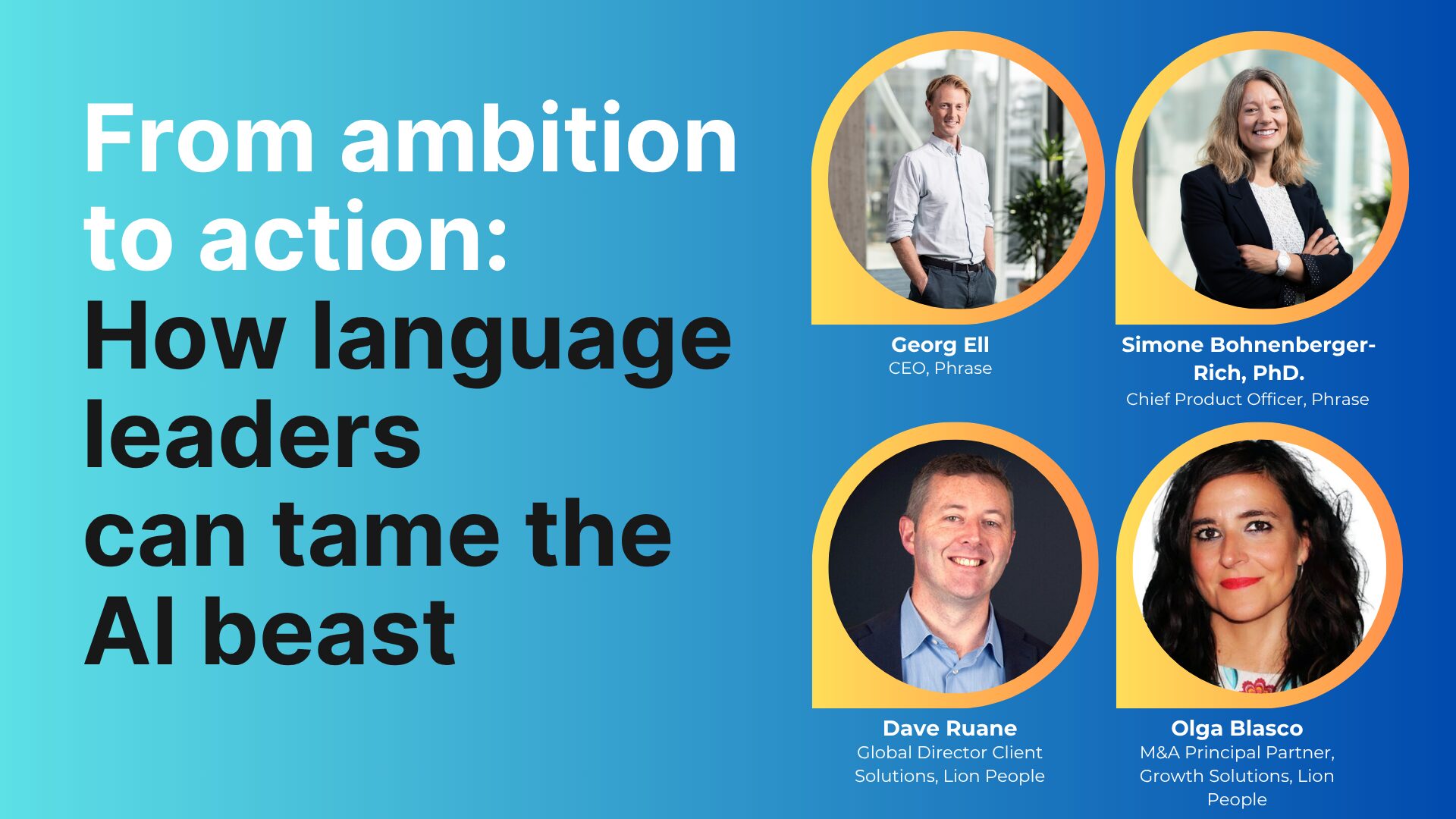Over the past two weeks, senior localization leaders, AI experts, and global content strategists attended a series of closed-door events across France, Germany, Japan, and the United States. From high-level keynotes to off-the-record roundtables, each session offered a rare opportunity for decision-makers to step outside day-to-day operations and talk candidly about where the industry is headed.
Under the Loc360° banner—and branded as UnLOCked in the U.S.—the events were designed to be small in size but big in scope. No stages. No vendor booths. Just sharp conversation and shared challenges in thoughtfully chosen venues, from AWS’s headquarters in Paris to a luxury conference space in Tokyo, and a landmark property in Dallas.
What emerged wasn’t just a snapshot of the state of localization—it was a glimpse into how the role of language is being redefined in the age of AI, automation, and accelerating global growth.
This is what we learned.
A series designed for strategy, not spectacle
Unlike traditional conferences, Loc360° isn’t about sales booths or slide-heavy presentations. It’s about peer exchange. Across four events—each limited in size but rich in diversity—more than 150 senior leaders from companies including DeepL, AWS, Emerson, Rakuten, Vinted, and Miro joined to ask hard questions, surface shared challenges, and reimagine what’s possible in localization.
As Georg Ell, CEO at Phrase, put it during his keynote in Tokyo:
Localization is no longer an afterthought—it’s a foundation for growth. The shift we’re seeing is from language as a service to language as strategy. And that’s a very different conversation.”
Shared themes across continents
While every event had its own focus, several clear themes echoed across the series.
AI: From buzzword to business driver
Across the board, it was clear: the conversation has moved beyond hype. AI is no longer viewed as a shiny new toy. The focus now is very much about what AI is actually doing to workflows, cost models, and customer expectations.
At Loc360° Paris, our live poll revealed that 37% of attendees saw real-time, AI-powered translation as the single most important development shaping localization over the next three years. Another 22% pointed to seamless integration into product and development workflows.
In Dallas, keynote speaker Tim Arata from Locale Solutions reframed the conversation entirely:
The number of ways to solve the ‘language problem’ has exploded. We used to have one or two permutations—now we have hundreds. And that’s forcing buyers and vendors to rethink how they collaborate.”
His advice was clear. Build stronger partnerships. Rethink how you work with vendors. And bring solutions architects to the front. They are the link between what the tech can do and what the business actually needs.
In Tokyo, attendees from Rakuten, Snowflake, and Woven by Toyota explored AI’s broader impact, particularly around content governance, intent preservation, and automation quality. As one guest mentioned during a ‘fireside chat’ session with AWS:
What does AI governance really look like in a localization context? It’s not just about translation quality. It’s about trust and transparency.”
Leading through ambiguity
Across all of the events, one theme came up again and again: the role of the localization leader is changing—and fast.
Localization used to be measured in words delivered. Now it’s tied to business impact. And that shift isn’t happening gradually. It’s happening under pressure.
In Berlin, leaders from companies like Kayak, Vinted, and Puma spoke frankly about the growing expectation to tie localization efforts to strategic outcomes. That means aligning with product timelines, proving ROI to execs, and, increasingly, taking ownership of how global content performs in-market.
In Paris, the mood was just as clear, as our poll of attendees revealed their biggest challenges in scaling localization: budget constraints, internal process complexity, and expectation management topped the list.
We’re being asked to drive change and justify it at the same time. That’s not an easy place to be.” – Loc360 Paris
The pressure isn’t just coming from above. AI is reshaping what’s possible, and what’s expected. Leaders now have to make judgment calls about automation, human oversight, and where to invest time and budget. And they need to be able to explain those decisions across teams.
The ability to tell stories with data is increasingly seen as a key driver of success. There’s a tangible need to utilize data to influence stakeholders across functions, and to translate the language of localization into the language of the business.
We need fewer localization dashboards and more commercial narratives. Nobody on the exec team cares about fuzzy match savings.”
At every event, there was a growing sense that localization is no longer a back-office function. It’s a strategic role. But the path forward isn’t clear-cut—and that’s exactly why conversations like these matter.
The human touch in an automated world
As might be expected, AI was at the front of everyone’s minds at all of the events, but so was the reminder that technology alone doesn’t solve for meaning, nuance, or intent. That still takes people.
In Tokyo, Phrase CEO Georg Ell introduced a concept that resonated throughout the day: “expertise translation.” It’s the idea that localization isn’t just about moving content between languages—it’s about making technical decisions understandable to non-technical teams, and strategic goals actionable across regions.
It’s not just about translating language,” he said. “It’s about translating ideas.”
That perspective came up again in Berlin, where panelists from DeepL and Kayak cautioned against seeing automation as a set-it-and-forget-it solution. AI might streamline workflows, but brand voice, cultural nuance, and risk assessment still require a human lens.
As Georg put it during his Tokyo keynote:
Hyperautomation only works when humans stay in control of the dials. Quality, speed, cost. That’s where the magic happens.”
Across all four events, the consensus was clear: AI can scale localization. But it’s people who shape the message, and decide when, where, and how it’s delivered.
City-by-city snapshots
Paris: Balancing AI and humans
Held at AWS’s Paris HQ in partnership with CSA Research, Argos, and AWS, Loc360° Paris was built around a core question: What does the next evolution of AI and human collaboration in localization look like?
CSA Research founder Don DePalma kicked things off by identifying ten key trends, from agentic AI to stakeholder evangelism and ROI frameworks. A standout panel featuring AWS, Miro, and Argos dove into the philosophical as much as the practical:
How do we ensure AI doesn’t just carry language, but intent? How do we balance automation with meaning?”
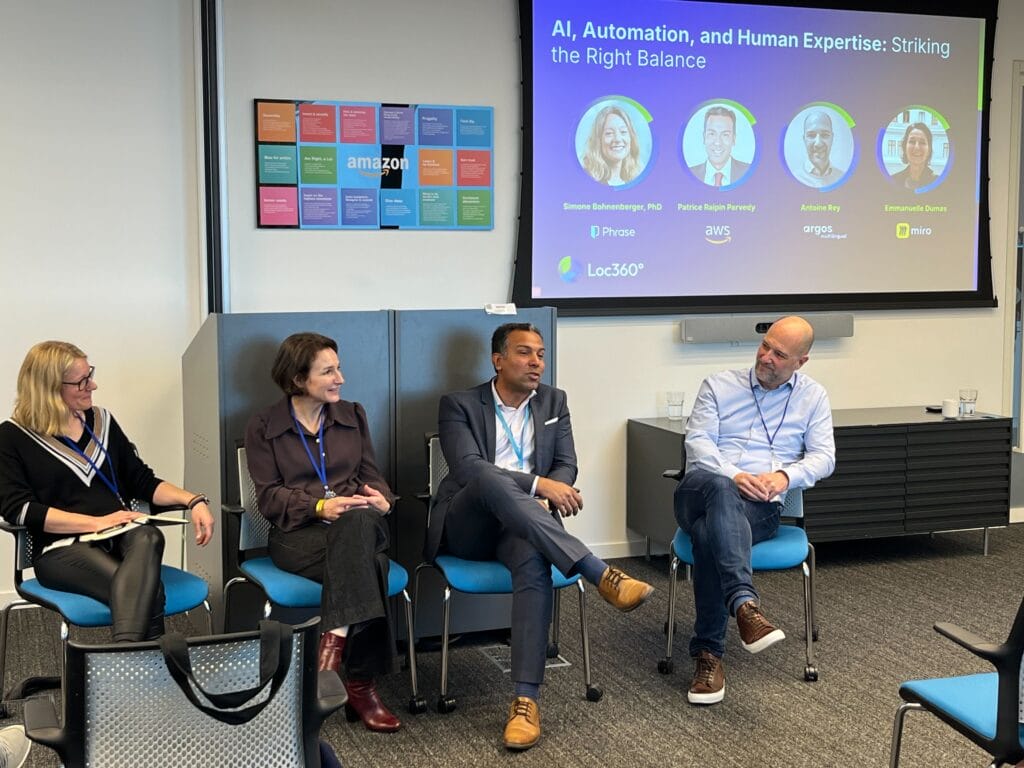
Roundtable discussions surfaced powerful insights—like the need to redefine success metrics. As one attendee put it:
We’ve been measuring wordcount for decades. But success today looks like speed to market, global content availability, and conversion.”
Tokyo: Hyperautomation, quality, and ecosystems
In Tokyo, the event took on a distinctly forward-looking tone. Titled “AI, Workflow & Hyperautomation,” the event was hosted in partnership with AWS and Honyaku Center, and featured a fireside chat with Phrase CEO Georg Ell, and Gary Ong of AWS, focused on “infinite work.”
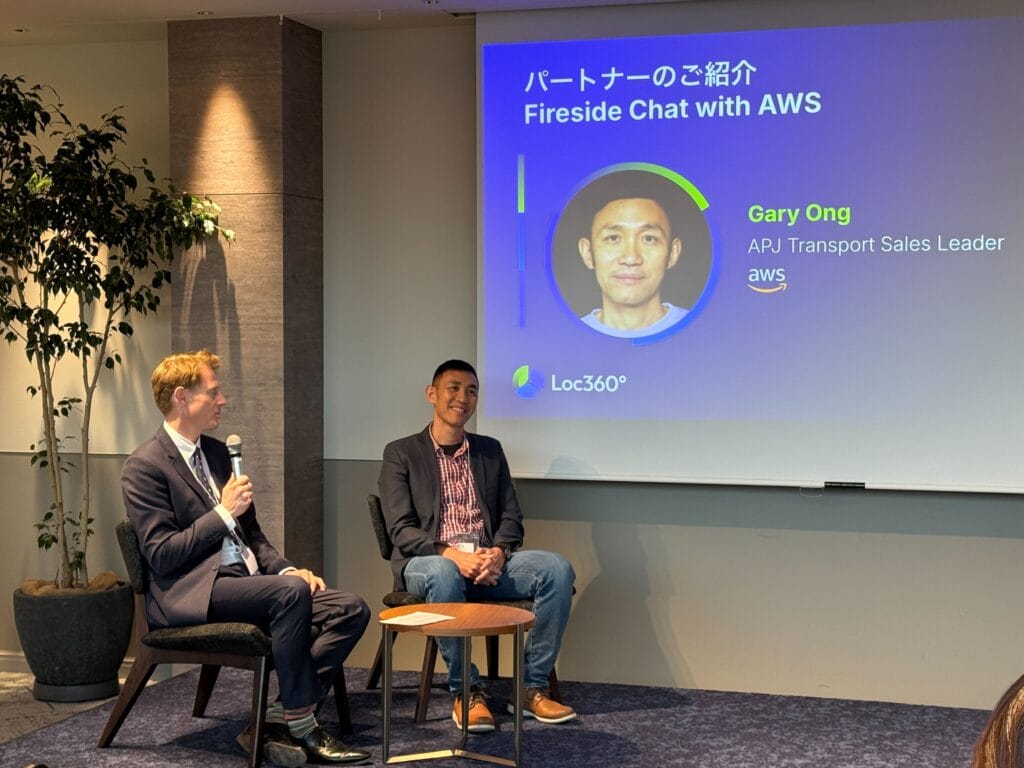
AI doesn’t shrink the job of localization—it multiplies it. The more personalization is possible, the more content we’ll need. The volume curve is exponential.”
Attendees discussed the ecosystem approach, including how Phrase and its partners are co-investing in integration, platform extensibility, and quality control measures that go far beyond machine translation. Questions during the Q&A probed everything from content cleanup to end-to-end automation, with a strong interest in making AI-driven processes more transparent and trustworthy.
Berlin: Metrics, maturity, and alignment
The Berlin event—hosted with Acclaro, DeepL, and Nimdzi Insights—was all about business impact. Keynote speaker Laszlo K. Varga from Nimdzi Insights laid the groundwork with insights on the evolution of localization roles, and Phrase’s Simone Bohnenberger-Rich, PhD moderated two panels tackling everything from MT misconceptions to stakeholder management.
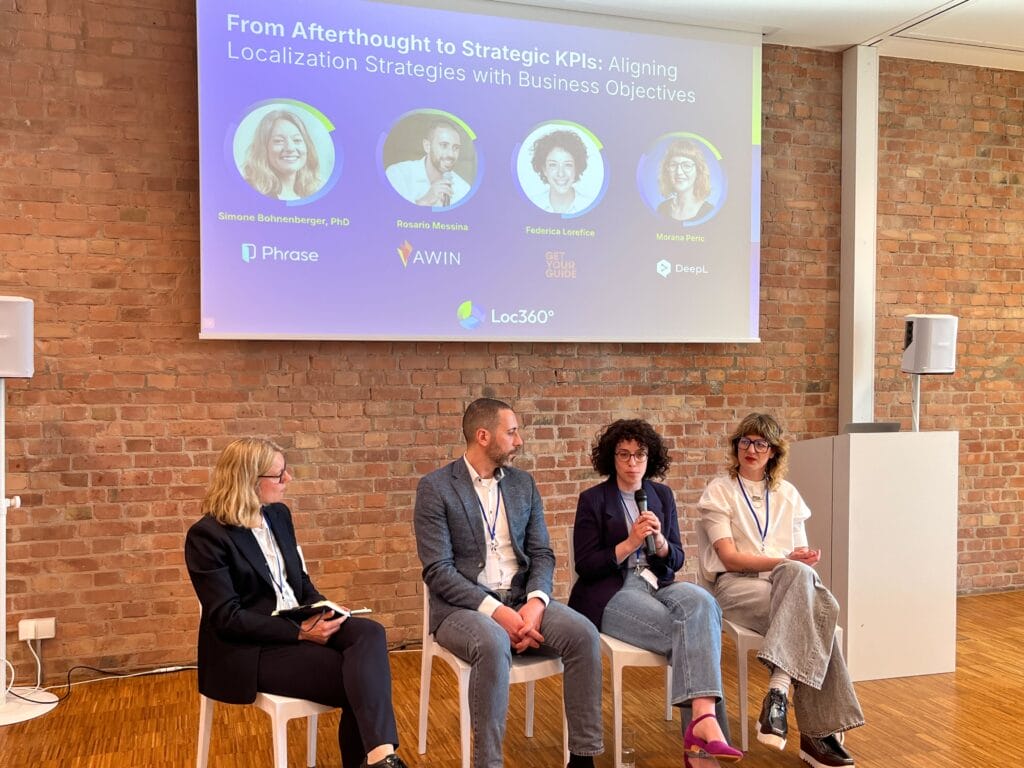
Panelists from GetYourGuide, Vinted, Awin, Kayak, and Puma explored how localization can shed its legacy as a “cost center” and be repositioned as a growth enabler. Practical examples flew across the table:
- Federica Lorefice (GetYourGuide) shared how internal metrics helped secure C-level buy-in.
- Martina Pancot (Vinted) discussed using customer experience data to prioritize content markets.
- Rosario Messina (Awin) noted that “localization only gets traction when you tie it directly to revenue.”
Roundtables unpacked what makes a successful localization metric, and why some fail to connect. One participant remarked:
We need fewer dashboards, and more stories. What’s the impact of our work? That’s what execs want to hear.”
Dallas: Reinventing the vendor equation
Unlike the other events, UnLOCked in Dallas carried a distinct tone. Held in partnership with Vistatec at the Ritz-Carlton Las Colinas, it focused heavily on vendor collaboration and operational excellence.
Tim Arata’s keynote urged a rethink of how buyers and providers align:
It’s no longer enough to hand off content and wait for results. The most successful teams are those that co-design solutions, share technical resources, and see vendors as strategic extensions of their teams.”
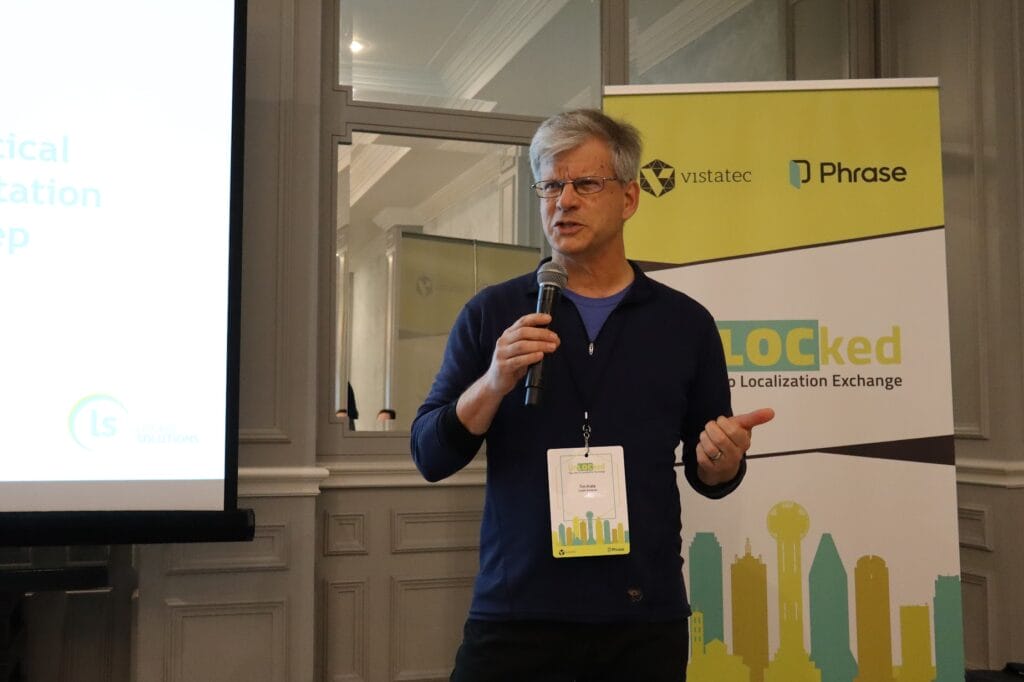
Panelists from Emerson, KnowBe4, Phrase, and Vistatec debated the future of the localization function in AI-heavy industries, from industrial tech to cybersecurity.
Cristina Feletto (KnowBe4) and Michel Farhi-Chevillard (Emerson) also brought the customer perspective into sharp focus, emphasizing the need for transparency, quality assurance, and tooling built for scale.
Conclusion: It’s still about people.
For all the talk of AI, automation, and strategy, the most consistent insight from Loc360° 2025 was simple: this industry thrives on connection.
Whether it was the shared head-nods in Paris as someone named a familiar challenge, the late-night hallway debates in Berlin, or the hands-up curiosity in Tokyo, these events showed the power of gathering the right people at the right time.
Because the future of localization isn’t just shaped by technology. It’s shaped by the people who use it—with creativity, strategy, and a sense of purpose.
What’s next
We’re just getting started.
More Loc360° and UnLOCked events are on the horizon. More insights will be shared. More voices will join the conversation. If you’re a senior leader navigating localization’s new landscape—and want to be part of this global dialogue—we’d love to hear from you.
Phrase events
Join us at one of our in person events in see first-hand how we’re transforming customer experiences and driving international growth.





